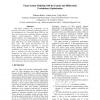Free Online Productivity Tools
i2Speak
i2Symbol
i2OCR
iTex2Img
iWeb2Print
iWeb2Shot
i2Type
iPdf2Split
iPdf2Merge
i2Bopomofo
i2Arabic
i2Style
i2Image
i2PDF
iLatex2Rtf
Sci2ools
162
Voted
CIMCA
2005
IEEE
2005
IEEE
Fuzzy System Modeling with the Genetic and Differential Evolutionary Optimization
This paper compares the performance of two provably successful evolutionary optimization tools in the optimization of a Fuzzy-Rule-Base (FRB) for the three well known fuzzy modeling inference methods: Zadeh's (center-of-gravity), Kosko's (StandardAdditive-Model), and Takagi-Sugeno's (local linear) Model. In the Fuzzy System Modeling of an uncertain data, FRB keeps the model information within the fuzzy rules. The initial fuzzy-rule-base for the evolutionary optimization algorithms is extracted using Bezdek's FCM. In the optimization, the normalized root mean square error of the training data is minimized for the fine-tuning of the FRB parameters for each of the inference models. The performance evaluation with the test cases indicates that differential evolutionary optimization achieves better results in terms of convergence speed and yields better parameters than the elitist genetic optimization.
CIMCA 2005 | Evolutionary Optimization | Evolutionary Optimization Algorithms | Intelligent Agents | Successful Evolutionary Optimization |
Related Content
| Added | 13 Oct 2010 |
| Updated | 13 Oct 2010 |
| Type | Conference |
| Year | 2005 |
| Where | CIMCA |
| Authors | Mehmet Bodur, Adnan Acan, Talip Akyol |
Comments (0)

